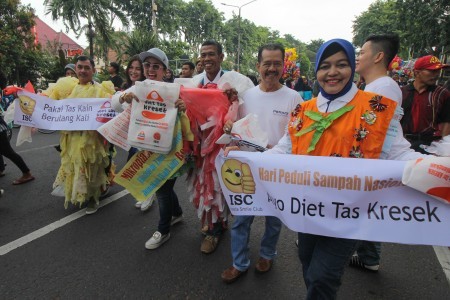Popular Reads
Top Results
Can't find what you're looking for?
View all search resultsPopular Reads
Top Results
Can't find what you're looking for?
View all search resultsPlastic producers reject excise, refuse to take blame for waste
Change text size
Gift Premium Articles
to Anyone
T
he Indonesian Olefin, Aromatic and Plastic Industry Association (Inaplas) has voiced its objection to a planned excise on plastic and refuses to take the blame for the acute problem of plastic pollution.
Inaplas deputy chairman Suhat Miyarso said in a statement on Tuesday that the main issue of plastic waste was the failure of authorities to create effective waste management, including the plastic waste, not the increasing use of plastic products, particularly plastic bags.
“Imposing an excise on plastic will have wide impacts on the plastics industry and related industries that use plastics, which are mostly small and medium enterprises,” said Suhat in a statement received by The Jakarta Post on Tuesday.
He argued that imposing an excise on plastic would also affect the investment climate, particularly in the plastics industry, which certainly would impact the upstream petrochemical industry.
On Monday, the Finance Ministry’s customs and excise director general, Heru Pambudi, said the government would start imposing an excise on plastics in May, as the draft of a government regulation on the matter was being discussed by the relevant agencies.
He said the Finance Ministry was targeting Rp 500 billion (US$35 million) in additional state budget revenue from the new excise.
Suhat said that, instead of imposing an excise on plastic, the government needed to improve waste management by involving the people, whose awareness to protecting the environment was beginning to grow, as indicated by the emergence of NGOs campaigning for reducing reusing, recycling garbage. (bbn)










